The Diverse Benefits of Learning an Instrument
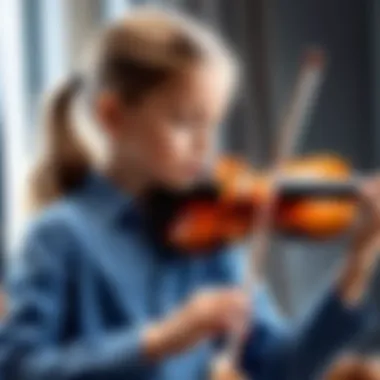
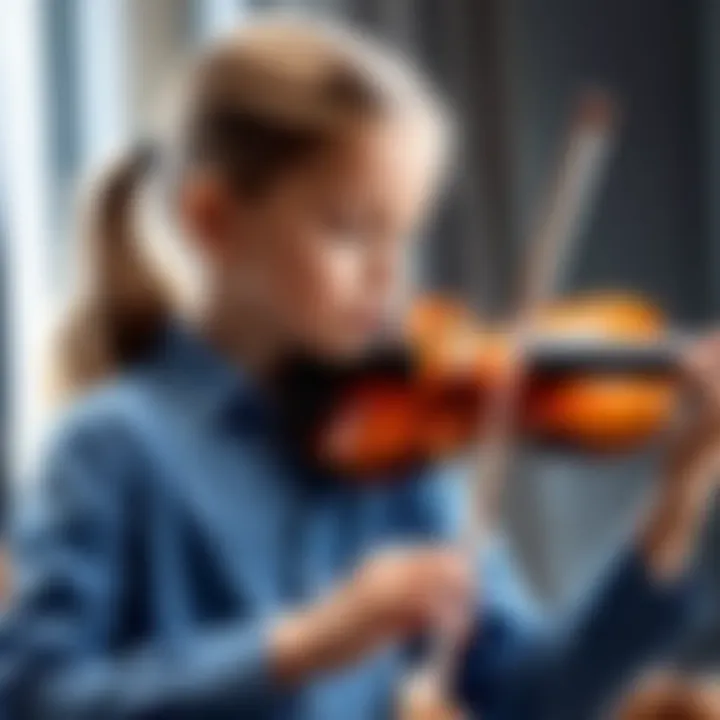
Intro
Learning to play an instrument is not simply a pursuit of musicality. It opens doors to a treasure trove of benefits that extend far beyond the notes on a page. With the continuous evolution of technology and an ever-growing understanding of human psychology and society, the multifaceted advantages of mastering this skill cannot be overstated. This article will dive into the various realms touched by music education—ranging from cognitive development to emotional growth, social interaction, and physical abilities.
The technological landscape is now infused with innovative tools that transform how one learns an instrument. Whether it's apps designed to teach and track progress or devices that enhance practice sessions, technology plays a pivotal role in shaping the modern musician's journey. As we explore these elements, we'll emphasize how the act of learning an instrument remains a vital part of personal development in an increasingly digital world.
Furthermore, this article will address emotional well-being related to artistic expression. Beyond simply playing notes, instruments serve as a conduit for emotions, allowing individuals to articulate feelings that might otherwise remain unsaid. The challenge of learning also cultivates perseverance and discipline, qualities that benefit various aspects of life.
Thus, this discussion is not just for aspiring musicians but rather for anyone interested in enhancing their cognitive, emotional, and physical capacities. By intimately linking music study to personal growth, it becomes clear that each strum, each key pressed, and each note played contributes to an enriched existence.
Cognitive Advantages of Learning an Instrument
Learning an instrument is not just about strumming a guitar or playing a note on a piano. It’s a journey that can amplify cognitive abilities in ways that might not be immediately apparent. The very act of making music engages the brain on multiple levels, weaving complex neural connections that bolster mental functions. Cognitive advantages are often underappreciated, yet they play a pivotal role in personal development and intellectual growth.
Enhanced Memory Capacity
When a person learns to play an instrument, memory becomes a muscle to flex. Musicians constantly memorize notes, passages, and entire pieces of music, thus stimulating areas of the brain responsible for long-term recall. Studies have shown that musicians often display superior memory skills than non-musicians.
People might consider how learning an instrument is akin to building a mental library; every new piece is like adding a book to the shelves.
- Musical memory includes both auditory and kinesthetic elements, meaning one has to recall not only the sounds but also the finger placements and body movements.
- The interaction between listening and playing creates a multifaceted approach to memory recall, which often translates into improved performance in academic and professional pursuits.
This correlation extends to practical situations in daily life—a musician may find it easier to remember names, tasks, or even complex sets of data. Enhanced memory capacity becomes second nature.
Improved Attention and Focus
The act of playing an instrument demands attention and concentration in a significant way. When musicians practice, they don't just hit the right notes; they must also read music, tap their feet to a rhythm, and often count beats. This multifaceted engagement trains one's ability to focus intensely.
As a result, individuals who devote time to music often develop better attention spans, allowing them to hone in on details more effectively.
- Practicing an instrument requires sustained focus for extended periods. Musicians learn to filter out distractions, which is a skill that benefits not just musical endeavors but also academic and work environments.
- This practice fosters a deeper connection with material being studied or tasks being executed, paving the way for greater productivity.
In a society filled with distractions from smartphones to constant notifications, the ability to focus like a sharpshooter is increasingly valuable.
Boosted Problem-Solving Skills
Music often presents challenges that require creative solutions. Whether it’s figuring out how to play a tricky passage or improvising during a jam session, the cognitive demands compel musicians to think critically and adapt in real-time.
Skills harnessed in this musical context resonate with problem-solving abilities in everyday life.
- By practicing how to approach intricate music structures, musicians become adept at breaking down complex problems into manageable parts.
- Jamming with others, for instance, fosters collaborative problem-solving, as musicians communicate non-verbally through their instruments, honing their ability to read a room and react swiftly.
Basically, every note played becomes a stepping stone towards sharper analytical skills that can translate to various life challenges—whether at work or home.
Development of Spatial-Temporal Skills
Spatial-temporal skills encompass the ability to visualize and manipulate objects in space and time. Learning an instrument enhances this skill set significantly, creating a sharp synergy between musical and mathematical abilities. This connection is not just theory; many musicians exhibit a knack for math and sciences as they progress in their musical education.
- Understanding scales, symmetries, and rhythms fosters a keen ability to comprehend positions and change over time. It’s like giving your brain an architectural blueprint to navigate complex ideas.
- Studies have found that engaging in music can lead to improved performance in spatially-related tasks, such as solving puzzles and understanding geometry.
In simple terms, embarking on the path of mastering an instrument cultivates essential cognitive skills that enhance one’s ability to interact with the world meaningfully.
Emotional Benefits Associated with Musical Training
Learning an instrument goes far beyond producing notes and rhythms; it touches the very fabric of our emotional well-being. Music has a unique ability to connect with our deep-seated feelings and experiences. As individuals dive into the world of musical training, they often find emotional growth intertwined with their journey. This section underscores the profound emotional benefits that can arise from mastering an instrument.
Heightened Emotional Intelligence
Musical training can act like a tuning fork for one’s emotional intelligence. Playing an instrument requires an awareness of one's own emotions and those of others, especially when playing in groups. This awareness can enhance empathy, allowing musicians to connect with others on a deeper level. Learning how to interpret different musical styles can also mirror the multitude of human expressions. Just as a soft melody can reflect sadness, a lively tempo can evoke joy. Over time, musicians develop a better understanding of emotional cues, improving their ability to navigate social interactions.
Stress Relief and Mental Health
In today’s fast-paced world, stress relief is a sought-after commodity. Engaging with a musical instrument provides a much-needed escape. The act of playing can induce relaxation, helping to quiet the mind. A study has shown that strumming a guitar or tapping on a piano can significantly reduce levels of cortisol, the stress hormone. Moreover, the rhythmic patterns and melodic lines often promote a meditative state. Many players describe their practice as a therapy session, where they can express their thoughts and feelings freely, making it an effective outlet for emotional release.
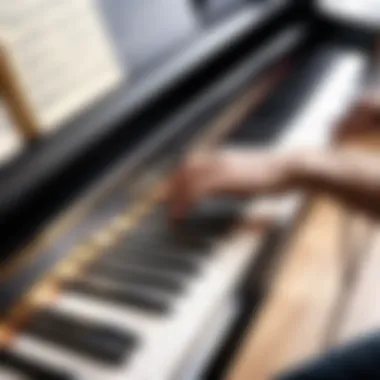
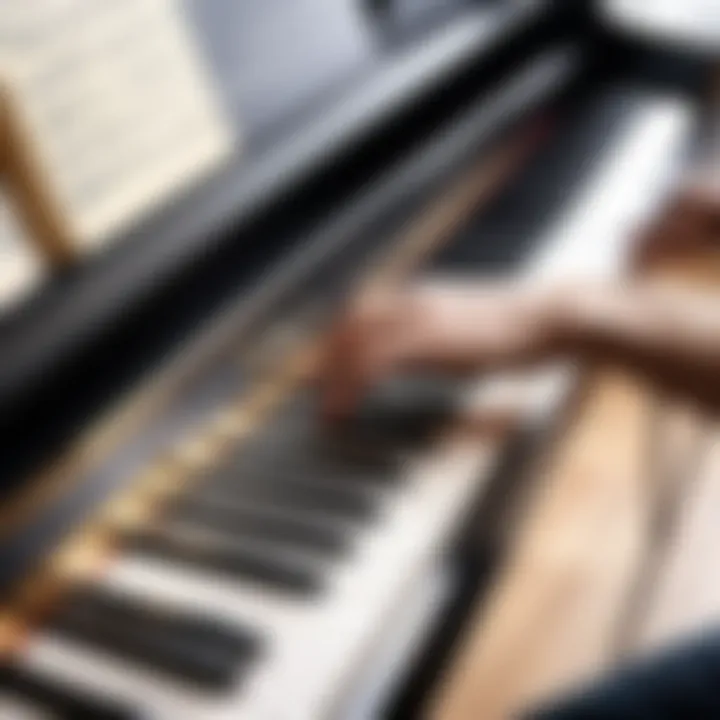
Fostering Resilience and Patience
Learning an instrument is not an overnight success story; it’s a marathon, not a sprint. Through consistent practice, musicians cultivate resilience and patience. Hitting a wrong note or struggling with a challenging piece are everyday challenges. Yet, these moments present an opportunity to learn and grow. Each stumbling block transforms into a stepping stone, teaching musicians to persevere. As they progress, players gain confidence in their abilities. This journey reflects a valuable life lesson: setbacks can lead to greater achievements, reinforcing their emotional backbone.
Cultivating Self-Expression
Music is a language that transcends words. Playing an instrument enables individuals to express feelings and thoughts that might otherwise go unvoiced. Each note struck carries a piece of the player's identity. Whether it’s the delicate strains of a violin or the powerful chords of a piano, the music created reflects personal experiences and emotions. This creative process not only allows for self-discovery but also builds a sense of ownership over one’s feelings. For many, it serves as a therapeutic process, providing a safe space to explore inner thoughts and embrace one’s identity.
"Music can change the world because it can change people." — Bono
In summary, the emotional benefits associated with learning an instrument are extensive. From heightened emotional intelligence to fostering resilience, music immerses its practitioners in a rich tapestry of emotional growth. The journey of musical training becomes a profound forcing ground for emotional exploration and development.
Social Benefits of Learning an Instrument
The exploration of social benefits associated with learning an instrument provides a panoramic view of how music education extends far beyond the music notes themselves. Engaging with music opens doors to a world where relationships flourish, collaboration reigns, and a sense of belonging is fostered. As individuals dive into the realm of music, they not only develop their skills on an instrument but also cultivate rich social interactions that enhance their lives. Here, we dissect the intricate layers of social advantages that come bundled with musical training.
Building Interpersonal Skills
Learning to play an instrument serves as a lively classroom for honing interpersonal skills. Musicians often find themselves engaging in group lessons or band practices, which presents them with opportunities to communicate effectively. They learn to listen actively and respond to their peers. For instance, a drummer might need to adjust their rhythm to align with the melody played by a guitarist. This dynamic interaction cultivates respectful communication and creates stronger bonds among musicians.
Moreover, through learning an instrument, one becomes sensitive to non-verbal cues like body language and facial expressions during performance. This fosters empathy and understanding—qualities that are invaluable in both personal and professional relationships.
Encouragement of Teamwork Through Ensembles
Participating in a musical ensemble is akin to joining a well-oiled machine, where each cog has a critical role to play. Through ensembles, musicians learn to value each member's contribution, crafting a symphony out of individual efforts. The very act of synchronizing with fellow musicians nurtures a deep appreciation for teamwork.
Ensemble settings demand commitment punctuality, and shared objectives, teaching individuals how to navigate collective responsibilities. The skills gained here can transcend into other areas of life, whether in academic group projects or workplace collaborations, often resulting in more efficient and harmonious outcomes.
Creating a Sense of Community
The world of music often feels like an expansive village where connections run deep. Learning an instrument allows individuals to forge relationships with others who share similar interests. Community music schools, local bands, and orchestras are more than just places of sound. They are hubs where friendships blossum, creating support systems that last a lifetime.
The sense of belonging that emerges within these communities fosters a cultural exchange; individuals share ideas, traditions, and styles that enrich everyone involved. Whether through informal jam sessions in local cafes or formal concerts, these gatherings not only showcase talents but also bind people together in shared experiences and memories.
Networking Opportunities in Music
The realm of music is often intertwined with a rich tapestry of connections and opportunities. Those who learn an instrument are frequently privy to networking avenues that can lead to new friendships and even career prospects. Whether it’s meeting fellow musicians at a community event or engaging with professionals at music festivals, the circles are vast and interconnected.
For instance, a jazz guitarist who performs at a local venue might meet recording producers or fellow artists who can collaborate with them. This kind of networking extends beyond immediate connections; it often opens pathways to larger opportunities in the music industry.
In summary, the social benefits of learning an instrument weave together interpersonal development, teamwork, community engagement, and networking. Each element is significant, helping individuals to navigate the world with finesse and connection. As one dives deeper into the practice of music, they invariably uncover these gems that shape not just musicians but well-rounded individuals.
"Music can change the world because it can change people." – Bono
Physical Aspects of Musical Learning
Engaging with an instrument isn't just about melodies and rhythms; it profoundly influences our physical capabilities. When diving into the specifics of the physical aspects of musical learning, we're looking at a treasure trove of benefits. Not only does musical training enhance our dexterity and coordination, but it also contributes to our overall posture and body awareness. This section embodies the essence of how music learning positively intersects with physical performance and well-being.
Developing Motor Skills
Learning an instrument can be likened to an intricate dance of fingers, hands, and even the body. Each note played demands not just creativity but also precision and speed. For instance, working on a complex piece on the piano necessitates the movements of both hands in opposite directions, which can be a real workout for fine motor skills. As musicians engage in repetitive practice, their fingers become adept at navigating the keys, strings, or frets. This muscle memory development is crucial; it builds agility and strength in the hands.
Even outside the realm of music, these enhanced motor skills can translate into daily tasks—like typing faster or cooking more efficiently—with a noticeable difference in ease and comfort. As creativity unfolds through practice, the body learns to respond with agility and coordination, skills which overlap into various life activities.
Coordination and Control
There's a symphony of coordination that occurs when learning an instrument, where both mind and body must synchronize to produce harmonious sounds. Take playing the guitar as an example: the left hand positions the fingers on the fretboard while the right hand strums or plucks the strings. This dual-layered movement calls for attention and physical control, instilling a sense of body awareness that extends beyond music itself.
Consider this: the act of maintaining rhythm while reading musical notes requires not just physical action but cognitive function, too. This coordination can foster an enhanced understanding of balance and control in various physical activities, from team sports to dance. Whether it's hitting a target or catching a ball, the benefits of coordination from learning musical instruments create ripple effects throughout numerous domains of activity.
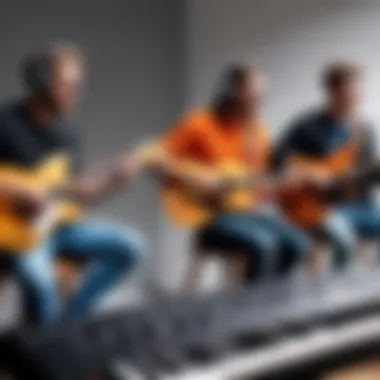

Posture Improvement Through Instrumentality
Playing an instrument compels a certain level of posture awareness that many other activities might not emphasize. Take the violin, for instance; holding it requires the player to develop a balanced stance, which promotes a neutral spine alignment. Musicians, more often than not, become acutely aware of how they position their bodies, leading to better posture in general.
This is especially important in today's world where slouching over screens is a common issue. A musician’s journey can instill a natural awareness of alignment and support for their body. The way they sit at their instrument or stand while playing can lead to healthier habits. With ongoing practice, musicians may find they not only play better, but they also carry themselves differently throughout their day.
"Engaging with music means engaging with your body; it goes hand in hand."
Cultural Appreciation Fostered by Music
Cultural appreciation in the context of learning an instrument is a cornerstone to understanding not just the music itself, but the humanity behind it. When individuals immerse themselves in the process of learning an instrument, they often find themselves drawn into the rich tapestry of the culture from which that music originates. This study has profound implications, enhancing one’s perspective on the global mosaic of musical expression.
Understanding Diverse Musical Genres
Diving into various musical genres is like taking a journey through different cultures, each with its own stories and traditions. Learning an instrument gives you first-hand experience of these genres, whether it's the sultry strains of flamenco guitar or the brisk rhythms of bluegrass banjo. You actually come to appreciate the nuances that make each genre distinct. For example, when learning jazz, students explore improvisation, which is not just a musical skill but also a cultural practice that stems from a rich history of African-American music, encompassing resilience and innovation.
"Music can change the world, and learning different genres allows you to feel that change."
Additionally, familiarizing oneself with world music genres enables the learner to step outside their comfort zone, fostering a connection with sounds that may previously have been alien. This can lead to a deeper appreciation for not only the music but also the values, struggles, and triumphs inherent in those cultures.
Engagement with Historical Contexts
Exploring the historical contexts in which various musical forms developed adds another layer to this cultural tapestry. Instruments are often intertwined with historical events, societal shifts, and the zeitgeist of eras gone by. When students study the sitar, for instance, they're not merely learning notes; they are engaging with India's spiritual traditions and the influence of classical music on modern genres.
By connecting music with its historical milestones—like the influence of the Civil Rights Movement on folk music—students develop a more grounded view of how music serves as a vehicle for social commentary and change.
As musicians dissect these connections, they cultivate a richer understanding of their music education.
Lifelong Learning and Personal Growth
Engaging with music through learning an instrument goes beyond just picking up a new hobby; it cultivates a mindset geared towards lifelong learning and personal growth. In a world that’s ever-changing, the skills you pick up from musical training can be your golden ticket to navigate various life situations effectively. Music serves as a unique catalyst, encouraging not just technical prowess but also fostering an attitude of curiosity and a love for continuous development.
Commitment to Continuous Improvement
The journey of mastering an instrument is a marathon, not a sprint. It demands a commitment to continuous improvement. When you decide to play the guitar or violin, each note, each practice session is a step towards mastery. This incremental progress teaches patience and dedication. As you set goals—like mastering a difficult piece or improving finger dexterity—you cultivate a habit of striving for better results. The satisfaction derived from achieving these milestones is infectious, likely pushing individuals to apply the same effort in other areas of life, such as career or personal projects.
The remarkable thing about commitment is how it transforms your perception. Just as you grow through practice, you learn to embrace challenges head-on. Here’s where the beauty lies. Musicians often find that this spirit of perseverance translates into real-world scenarios. Troubleshooting a tricky passage in a song bears resemblance to solving challenging problems at work. Hence, musicians develop not just as artists, but as resilient individuals who tackle adversity with a hands-on approach.
Exploration of New Skills and Techniques
Learning an instrument offers an exquisite buffet of skills to explore. From basic chord progressions to complex compositions, each level of expertise invites further exploration. The beauty of music allows for endless creativity—think of jazz improvisation or classical sonatas—both require a foundation yet invite innovative expression.
Musicians are often at the forefront of adopting new skills, whether it’s discovering a unique strumming technique on the guitar or exploring digital audio workstations to enhance their sound. This exploration leads to more than just technical skill; it nurtures adaptability.
To truly grasp the essence of each musical transition, one might:
- Experiment with different genres
- Learn about music theory
- Use technology to record and analyze their play
By experimenting, musicians expand their skill set, embracing not only the instrument but also the surrounding culture, resulting in a richer learning experience. Those who embark on this path often find themselves not just being better musicians, but also more versatile individuals in diverse spheres of life, maintaining the willingness to learn and grow.
"Continuous learning is the minimum requirement for success in any field."
— Brian Tracy
Integration of Technology in Musical Learning
In this digital age, the ways of learning have transformed dramatically, especially in the realm of music. Technology in musical learning is not just a convenience but a necessity that opens up a wide range of opportunities for aspiring musicians. This integration has revolutionized not only how students practice but also how they collaborate, perform, and ultimately grow in their musical journeys.
The incorporation of technology can energize the learning process, lending itself to various digital tools and online resources that cater to different learning styles. Consider the impact of mobile applications, online tutorials, and virtual instruments; these resources have flattened the learning curve, giving students the flexibility to engage with music on their own terms. Technology mitigates geographical limitations, allowing access to world-class educators and mentors who might be thousands of miles away. This cultural and educational exchange enhances understanding, sparking inspiration through diverse styles and traditions.
Digital Tools for Practice Enhancements


Digital tools are like having a personal coach right at your fingertips. Apps designed for music practice have ramped up the learning experience, providing user-friendly interfaces and immediate feedback. For instance, a platform like Yousician uses real-time analysis to track your progress and suggest corrections on multiple instruments from the guitar to piano.
- Intelligent Metronomes: Gone are the days of mechanical metronomes. Advanced digital metronomes can generate complex rhythms and even adjust tempos automatically based on your playing speed. This is particularly helpful when training your ear to mix genres.
- Tuning Apps: Instruments need to be tuned properly for the best sound. Apps like GuitarTuna take the guesswork out of this task with visual aids that guide you through tuning with precision.
Tools offering video capabilities can also be transformative. Students can record their practice sessions, enabling them to analyze their playing style and progress over time. This reflective practice can be eye-opening, allowing for adjustments that may not be evident in the moment.
"Learning an instrument with the help of technology turns a traditionally personal journey into an interactive experience, with immediate feedback and endless resources to harness."
Online Platforms for Collaboration
The internet has broken down barriers to collaboration in a way that was unthinkable in times gone by. Platforms such as SoundCloud and BandLab create spaces for musicians to connect, share, and build together, fostering a sense of community that traverses borders. Musicians can collaborate on tracks in real time, regardless of their physical locations.
The advantages of online collaboration are numerous:
- Diverse Perspectives: Working with artists from different regions fosters cross-cultural creativity. Collaboration sparks innovation that might not have emerged in isolation, enriching musical compositions.
- Networking Opportunities: These platforms are often teeming with individuals eager to expand their reach. Many musicians find new opportunities for gigs, collaborations, or promotions simply by engaging with others online.
- Access to Resources: Participants in online communities can exchange knowledge, tips, and experiences, enhancing their learning. This collective wisdom leads to improved techniques and unique styles.
Thus, when musicians engage with these technologies, they are not just learning an instrument; they are stepping into a modern musical landscape brimming with potential and possibilities.
Societal Contributions of Musicians
Learning an instrument not only benefits the individual musician but also extends far beyond personal gains, making significant contributions to society. The act of creating and performing music acts as a unifying force, bringing people together in ways that few other activities can. Musicians have the unique ability to inspire, engage, and motivate communities, using their art to affect real change.
Impact on Community Programs
Musicians often serve as catalysts for community programs that aim to promote cultural awareness, inclusion, and accessibility. By using their talents, they create worthwhile events that enable participation from various demographics. For instance, community concerts or music festivals can serve as platforms for local artists, providing them the spotlight while fostering a sense of pride and ownership within neighborhoods.
Beyond entertainment, these events oftentimes contribute economically. Local businesses benefit from increased traffic, and event planners can employ local vendors for equipment rental, food, and other services. The broader economic impact is undeniable; it’s like a ripple in the pond, each performance sparking more activity and connection.
Moreover, musicians often collaborate with educational institutions to establish outreach programs. These initiatives may include after-school music classes for children or collaborative projects with local schools. As a result, children not only develop their musical skills but also engage in teamwork and community involvement. The tangible effect of such programs is seen in the enrichment of local culture, as well as personal growth for individuals who may not have had the opportunity otherwise.
Using Music for Advocacy
Music also plays a pivotal role in advocacy. Many musicians leverage their platforms to raise awareness on social issues, using their voice — both literally and metaphorically — to advocate for change. Powerful lyrics and poignant melodies can articulate complexities surrounding topics such as inequality, environment, and mental health, inspiring listeners to reflect and take action.
For instance, think of how artists like Bono from U2 have mobilized vast audiences, not just through music, but through their relentless advocacy for human rights and global health initiatives. By turning their concerts into fundraisers or awareness campaigns, they create powerful dialogues that resonate with thousands, if not millions, of fans. This connection between music and advocacy becomes a vehicle for transforming societal attitudes.
In addition, many local musicians engage in social campaigns, participating in charity events to support causes they care about. They often perform at rallies or host benefit concerts, using the collective power of their community to foster change. This grassroots level impact can be incredibly powerful, tapping into the shared experiences of the audience.
"Where words fail, music speaks." – Hans Christian Andersen
Ultimately, the societal contributions of musicians are multifaceted, influencing everything from uplifting local economies to shining a spotlight on pressing social issues. Their ability to engage the community in diverse ways showcases the profound and necessary role music plays in society.
Whether through community programs or as advocates for change, musicians not only enrich the cultural landscape but also help galvanize voters, empower communities, and foster connections that may otherwise remain unformed.
End: Embracing the Journey of Learning an Instrument
Learning an instrument is not just about producing sound; it is about constructing a framework for personal development and self-discovery. It cultivates patience, as mastering chords or scales often requires time and repeated effort. It also builds resilience, teaching individuals to navigate through challenges and setbacks, transforming moments of frustration into lessons in persistence.
The cognitive enhancements from musical training are profound. The ability to enhance memory, focus, and problem-solving skills not only assists with music but seeps into other areas of life, creating a well-rounded intellect. It's like picking up a toolbox; each skill learned adds a new tool for handling various tasks, whether they be academic or personal.
Moreover, emotional well-being flourishes through the creative outlet music provides. Playing an instrument can be a sanctuary from daily stressors, allowing individuals to express themselves in ways words often cannot.
In addition, the social benefits tied to learning an instrument—forming friendships through bands, orchestras, or even informal jam sessions—cannot be overlooked. These connections often last a lifetime, and the collaboration that comes with music fosters teamwork and communication skills that are vital in both personal and professional realms.
As we reflect on this engagement with music, it's worth highlighting that these advantages are experienced at every stage of life. Whether starting as a child or picking up an instrument later in life, the journey can be equally enriching. Here’s what musicians often note about their experiences:
"Music is a universal language that goes beyond words. It opened doors that I never knew existed, both within myself and in connecting with others."
In summary, the commitment to learning an instrument is an investment in one's overall development. It invites us to dive into our creativity, challenges our thinking capabilities, nurtures our emotional state, and connects us with a wider community. Ultimately, embracing this journey means recognizing the value of music as a skill set that enhances life's quality in unparalleled ways.
Reflecting on Personal Experiences
As individuals share their experiences with music, the narratives often reflect unique paths of transformation. Some recall the nervousness of their first performance, which later fueled a passion for public playing, while others reflect on quiet moments spent alone, lost in composition or practice. Everyone has a story, and those stories often reveal the true essence of music in people's lives.
- Foundations Built in Childhood: Many begin their musical journey as children, absorbing lessons that shape their identity. The journey often includes simple moments of joy—like playing for family—leading to a growing sense of belonging.
- Rediscovery in Adulthood: For some, revisiting an instrument years later often acts as a catalyst for change. The act of learning a piece once forgotten can reignite a passion that was buried under life's demands.
- Community and Collaboration: Engaging with others enhances the experience. Just as musicians feed off each other's energy, the collaboration brings a shared joy, often accompanied by laughter and a few missteps that become memories.
The stories are varied and showcase the deeply personal nature of learning an instrument. These reflections underline how, in learning to play, we aren't just mastering an art form; we’re participating in a transformative experience that shapes us in ways we might only realize long after the last note has been played.







